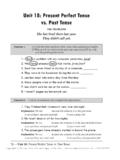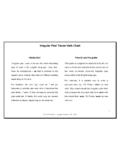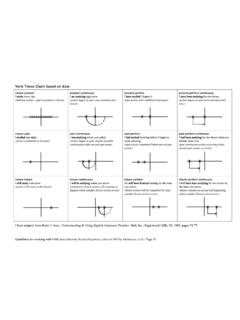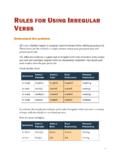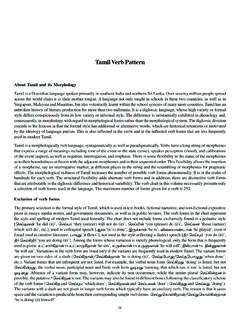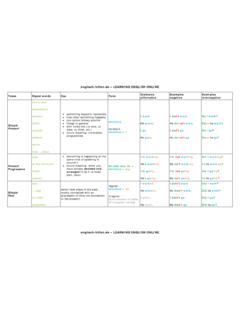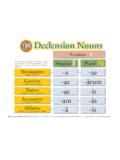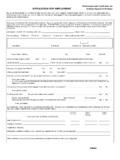Transcription of Spanish Verb Chart
1 Spanish verb TensesINDICATIVESUBJUNCTIVEPRESENTFUTURE PASTP resent PerfectPresentPresent PerfectPresentYo habloI yo I yo haya I have spokenYo he habladoI have yo yo I spokethird-person plural preterite,drop -ron, add: hayahayashayahayamoshay ishayan + past participle hehashahemoshab ishan+ past participle PreteriteYo habl I spoke-ar- -aste- -amos-asteis-aron -er / -ir- -iste-i -imos-isteis-ieron andar, conducir, dar, decir, estar, hacer, ir, poner, poder, querer, saber, ser, tener, traer, venir, ver,yo-form spelling changes, stemchangers, i y spelling changesfirst-person present,drop -o, add:dar, estar, haber, ir, saber, ser-car que, -gar gue, -zar ce, -cer za, -ger/-gir ja, -guir ga, -guar g e, -uir ya, quir ca -ar-e-es-e-emos- is-en-er / -ir-a-as-a-amos- is-an (the Preterite Perfect is not used in spoken language and is rarely used in writing.)
2 (-se endings are primarily used in Spain)Preterite Perfecthubehubistehubohubimoshubisteishu bieron + past participle Yo hube habladoI had spokenPluperfecthab ahab ashab ahab amoshab aishab an + past participle Yo hab a habladoI had spoken-er-o-es-e-emos- is-en -ir-o-es-e-imos- s-en -ar-o-as-a-amos- is-anstem changers:e ie: cerrar, empezar, entender, pensar, perder, preferir, querer, recomendar, sentir, tener, veniro ue: almorzar, contar, dormir, encontrar, morir, mover, mostrar, poder, probar, resolver, volver e i: corregir, decir, elegir, medir, pedir, repetir, seguir, servir, vestirirregular yo form:caber, dar, estar, saber, ver-go verbs: caer, decir, hacer, poner, salir, tener, traer, valer, venir-zco verbs: conducir, conocer, obedecer, ofrecer, parecer, traducirspelling changes:-cer/-cir zo, -ger/-gir jo, -guir go, -quir co, -uir uyother irregulars.
3 Adquirir(i ie), jugar(u ue), oler(o hue), ir, ser, estar, o r, re r, -iar , -uar abrir abierto, cubrir cubierto,decir dicho, escribir escrito,hacer hecho, imprimir impreso, morir muerto, poner puesto, resolver resuelto, romper roto, ver visto, volver vueltopast participles-ar -ado, -er / -ir -idoif a vowel precedes the ending,add an accent. leer le yo hubiera yo hubiese I had spokenhubierahubierashubierahubi ramoshubieraishubieranhubiesehubieseshub iesehubi semoshubieseishubiesen + past participleImperfectYo hablabaI spoke-ar-aba-abas-aba- bamos-abais-aban -er/ir- a- as- a- amos- ais- an only three irregulars.
4 Ir iba, ser era, ver ve a -ra-ras-ra-ramos-rais-ran -se-ses-se-semos-seis-sen oror (hubiese forms are primarily used in Spain)Future(also)Future PerfectConditionalConditional PerfectYo hablar I will speakYo voy a hablarI am going to speakYo habr habladoI will have spokenYo hablar aI would speakYo habr a habladoI would have spoken+ past participle habr ahabr ashabr ahabr amoshabr aishabr an + past participle habr habr shabr habremoshabr ishabr n + a + infinitivevoyvasvavamosvaisvan caber cabr-, decir dir-,haber habr-, hacer har-, poder podr-, poner pondr-,querer querr-, saber sabr-,salir saldr-, tener tendr-,valer valdr-, venir vendr-add to infinitive:add to infinitive.
5 - - s- -emos- is- n- a- as- a- amos- ais- ansame irregulars as future tensethe verb haber Used by itself, Haber means "there is or there are." It can only be conjugated in the third-person singular regard-less of the number of objects in the is also used as an auxiliary verb when forming the perfect tense. In that case it means to have. hay there is, there arehubo there was, there werehab a there was, there werehabr there will behabr a there would b
